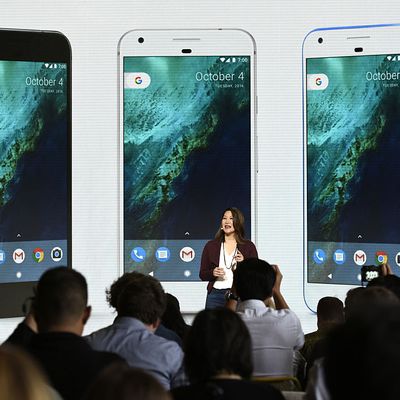
Today, Google announced that it’s buying the Pixel phone division of HTC for $1.1 billion. This isn’t Google buying the Taiwanese consumer-electronics manufacturer entirely — it’s simply stripping out a large number of employees, likely the ones who have been making its Pixel phones for the last two years. And it’s doing it because Google realizes it has to build a phone that can stand up to the iPhone.
HTC and Google have a long history. HTC has been a partner in building some of Google’s earlier Nexus phones, meant to be an Android lodestar — the phone that showed what Android should look and act like. It also built the last Pixel, and is reportedly manufacturing the Pixel 2, though both are “designed by Google.” Acquiring HTC’s Pixel phone division “will help [Google] grow scale in the high-end while turning it into a major competitive threat to the other Android [manufacturers] rather than just as a point of reference,” says David McQueen, research director at ABI.
In other words, HTC is table stakes for Google to get serious about building a high-end phone to compete with Samsung (its nominal partner, and by far the largest seller of Android devices) and perhaps more importantly, Apple.
The true appeal of the iPhone, as Cupertino will happily tell you, isn’t that its phones look so good or sport such impressive hardware. It’s that Apple can tightly bind its hardware — the iPhone — to its software — iOS. Apple’s hardware and software can act in concert; it’s one of the reasons it was able to roll out augmented reality so much faster than its competitors — Apple knows exactly what every phone or device running iOS can do.
Google’s Android simply can’t compete on that front. It’s long become the dominant global OS, but the iPhone remains the most popular singular phone (though the Samsung Galaxy series is usually a close second place, and sometimes surpasses the iPhone for a quarter or two). And this is because if you want to use iOS, you have to buy an iPhone. And right now, iOS is the most pleasant OS to use on a smartphone — and has a ton of ways of keeping users locked in, the most important being Apple’s proprietary texting format, Messaging.
Google, until this HTC acquisition, would never be able to compete with Apple at binding together hardware and software while contracting work to other companies. By bringing in thousands of engineers (about 2,000, per the New York Times, at the relatively cheap price of $550,000 per engineer), it can.
In the short term, this still shouldn’t worry Samsung or Apple very much. The Pixel, per ABI estimates, has only moved about 2 million units since its release last year. The iPhone 7 and 7 Plus sold 32 million phones in the second quarter of 2017 alone, and the Samsung S8 and S8 Plus sold 19 million in the same period. The leaked pictures of the Pixel 2 don’t look like they’ll significantly change those numbers.
In the long term, Google seems to realize that it’s Apple that poses the biggest existential threat to the company (even if its most direct competitor is probably Facebook, with the two splitting the vast majority of the online-advertising revenue). Apple’s Siri uses Bing for its knowledge base. Google is paying a reported $3 billion a year to keep its search engine as the default search engine on the iPhone. The two companies haven’t broken out in out-and-out war, but there’s sniping at the edges. Apple is quick to point out its privacy policy without mentioning Google by name; Google subtly hints that its Google Assistant is far superior at most tasks compared to Siri.
The majority of people will be reading (and searching) on smartphones in the very near future, and Google’s entire advertising business depends largely on being the dominant search engine (and data aggregator). The only way to secure that future is to build a phone that can truly rival the iPhone. Having the dominant OS isn’t enough if the world’s most popular phone can simply be walled off from you. (Whether iPhone users would being willing to be walled off from Google is a more interesting question, but one Google doesn’t seem willing to think about.) Samsung has tried, and it has come close. But now Google, with fresh injection of talent from HTC, wants to take its own shot.





























